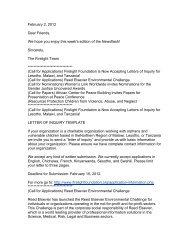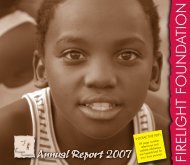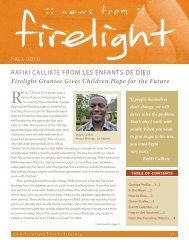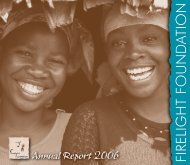From Faith to Action - Faith to Action Initiative
From Faith to Action - Faith to Action Initiative
From Faith to Action - Faith to Action Initiative
- No tags were found...
Create successful ePaper yourself
Turn your PDF publications into a flip-book with our unique Google optimized e-Paper software.
Prolonging the Life of People Living with HIVIt is critical that antiretroviral drug treatment <strong>to</strong> preventmother-<strong>to</strong>-child transmission and <strong>to</strong> treat HIV infectionbecomes widely available in Africa. Until it does, the HIV/AIDSrelateddeath <strong>to</strong>ll will continue <strong>to</strong> rise at an alarming rate,leaving increasing numbers of children orphaned, in need ofcare, and at risk of HIV infection themselves. Community andfaith-based groups can play an important role at the local levelin the promotion of these life-saving medications. They caneducate the public <strong>to</strong> mobilize advocacy for treatment access,identify the people most in need of immediate treatmentsupport, and help ensure that people receiving treatmentadhere <strong>to</strong> the recommended regimen. They often providethe emotional support needed <strong>to</strong> make treatment successful.In addition, they link people living with HIV <strong>to</strong> local healthclinics that offer nutritional support and supply medicines<strong>to</strong> treat illnesses such as pneumonia, tuberculosis, diarrhea,and malaria.Addressing Caregivers’ NeedsHelps Children Remain in FamiliesIt is diffi cult for caregivers <strong>to</strong> work or attend school when theyare caring for children who are young or have special needs.Caregivers who are elderly or ill often require respite. Daycareprograms provide caregivers with time <strong>to</strong> attend <strong>to</strong> otherneeds while giving children opportunities <strong>to</strong> play and learn.Support groups give caregivers the opportunity <strong>to</strong> share theirhardships and learn about how <strong>to</strong> better meet the emotionaland developmental needs of children. Programs that easethe burden on caregivers reduce the risk that children will beneglected, abandoned, or placed in an orphanage.Kara Counseling and Training Trust, Lusaka, ZambiaKara’s daycare program offers comfort <strong>to</strong> sick children in need ofhealth care and nurturing. It also offers their family members greatcomfort, knowing that they can continue working while their childrenare looked after during the day. In addition, Kara teaches caregiversof sick children how <strong>to</strong> better care for them at home. Children whoare <strong>to</strong>o sick <strong>to</strong> travel <strong>to</strong> the daycare center, or whose families are nolonger able <strong>to</strong> care for them, can be admitted on a short-term basis<strong>to</strong> Kara’s hospice, one of Zambia’s few inpatient options for poor andterminally ill children. There they receive needed health and pas<strong>to</strong>ralcare, as well as learning and play opportunities.When parentsreceive life-savingmedications, theycan care for theirchildren in<strong>to</strong> thefuture.AIDS Outreach Nyaka<strong>to</strong>, Mwanza, TanzaniaEmmanuel James is a 35-year-old volunteer with AIDS OutreachNyaka<strong>to</strong>, a faith-based organization in Mwanza, Tanzania. In 2004, hiswife got sick, <strong>to</strong>ok their children, and returned <strong>to</strong> her parents’ homewhere she later died. Ill and destitute himself, Emmanuel did notknow what <strong>to</strong> do. He was introduced <strong>to</strong> the AIDS Outreach Nyaka<strong>to</strong>Center, which <strong>to</strong>ok him <strong>to</strong> be tested at the voluntary counselingand testing center. He found out he was HIV positive and had adangerously weakened immune system. The Nyaka<strong>to</strong> staff <strong>to</strong>ok him<strong>to</strong> a clinic where he received antiretroviral treatment. At the start ofhis treatment he weighed 48 kilograms (106 lbs). Six months laterhe weighed 61 kilograms (135 lbs). Emmanuel has used his renewedstrength <strong>to</strong> help others, providing outreach services <strong>to</strong> children andadults who are HIV positive. Emmanuel says, “I am like a book in thecommunity. I was so sick and now I am a volunteer reaching out <strong>to</strong> otherpeople who are isolated and sick like I was…I thank God who has givenme courage.”Ngwangwa Orphan Care and Chitukuko Group,Balaka, MalawiNgwangwa Orphan Care and Chitukuko Group was started by a groupof parents who had either lost children <strong>to</strong> HIV/AIDS or had takenorphans in<strong>to</strong> their homes. They conducted a needs assessment of 32villages that identifi ed over 3,000 orphans in their region. In response,they initiated several activities, including village-based daycarecenters, communal gardens <strong>to</strong> benefi t vulnerable children, and aneducation committee <strong>to</strong> keep children in schools. Ngwangwa alsooffers caregivers counseling and training in child development.Daycare centers are run by volunteers in their own homes, with thesupport and oversight of village HIV/AIDS committees. Ngwangwasupports the centers by providing training and play materials. Onemeal is provided <strong>to</strong> children each day. The centers are open for at leastfour hours daily, allowing caregivers <strong>to</strong> work.11








